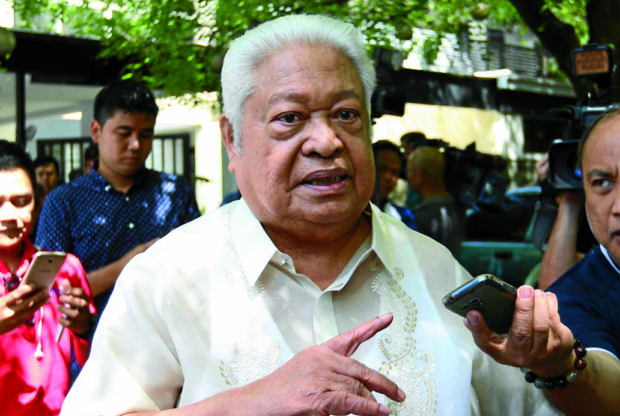Senators assured: ‘Quickie’ splits barred in divorce bill
“Quickie,” or “express” divorces, are not allowed in the absolute divorce bill, Albay Rep. Edcel Lagman clarified on Friday, after several senators expressed reservations about the measure.
“The absolute divorce bill does not allow ‘drive through,’ ‘no-contest’ or ‘quickie’ divorces,” Lagman said, adding that there were provisions in the bill that would prevent collusion between married couples as well as coercion by one of the parties.
On Wednesday, the House committee on population and family relations approved the bill by a unanimous vote.
It could be tabled for plenary debate next week and passed on third reading before the congressional break in March, Speaker Pantaleon Alvarez said.
Officials of the Catholic Bishops’ Conference of the Philippines (CBCP) expressed disappointment over the House of Representatives’ approval of a bill that would legalize divorce in the country, calling it “antimarriage and antifamily.”
Article continues after this advertisementPastoral statement
Article continues after this advertisement
“By passing this measure, Congress betrays its mandate to protect our country’s legally and morally declared social and inviolable institutions,” Fr. Jerome Secillano, executive secretary of the CBCP’s permanent committee on public affairs, said in his Facebook account.
Also on Friday, Lipa Archbishop Gilbert Garcera issued a pastoral statement criticizing the approval of the divorce bill and stressing the “sanctity and dignity of marriage as a sacrament … as enshrined in the 1987 Constitution.”
“Let not Congress lay waste to these victories with a divorce bill,” said Garcera, the chair of the CBCP’s Episcopal Commission on Family and Life.
Lagman, who headed a House subcommittee that drafted a substitute version of the bill, allayed the fears of several lawmakers who said they did not want to see “drive-through,” or “quickie divorces,” as in the United States.
Limited grounds
“The bill unequivocally provides that ‘no decree of absolute divorce shall be based on a stipulation of facts or confession of judgment,’ which is a prohibition on a no-contest divorce,” the Albay representative said in a statement.
Lagman said the bill would authorize the Office of the Public Prosecutor to conduct investigations to determine whether there was collusion between the spouses.
Steep penalties of five years’ imprisonment and a P200,000 fine could be imposed on a spouse who coerces the other into filing a petition for divorce, as well as on colluding spouses, he said.
Under the measure, spouses may secure a divorce “under limited grounds and well-defined judicial procedures to terminate a continuing dysfunction of a long broken marriage.”
The bill seeks to allow couples separated for at least five years to file for absolute divorce, except if the separation is due to overseas employment, or if both spouses are residing in separate distant regions.
Other valid reasons for a divorce in the pending measure are psychological incapacity, gender reassignment surgery, and irreconcilable marital conflicts resulting in the breakdown of the marriage beyond repair.
The Philippines is the only state in the world, aside from the Vatican, where divorce is not allowed.
“The Catholic Church is all for the protection of rights especially of the aggrieved parties in marriage. But protection of rights should go hand in hand with upholding our cherished institutions like marriage,” Secillano said.
‘Project of Satan’
“While divorce may indeed vindicate the rights of women, as congressmen believed, it is unfortunately to the detriment of marriage and family as sacred institutions that should otherwise be protected by the state,” he added.
Sorsogon Bishop Arturo Bastes urged the clergy to “rally against this law by showing the disastrous effect of divorce that destroys the family, the basic unit of society, and the domestic Church.”
“The destruction of families by divorce is indeed a project of Satan,” said Bastes, who chairs the CBCP’s Episcopal Commission on Mission.
